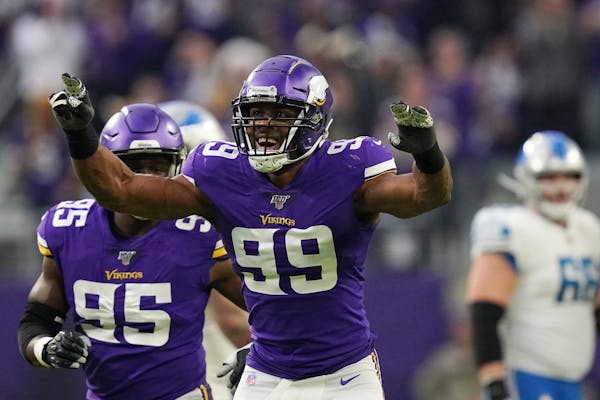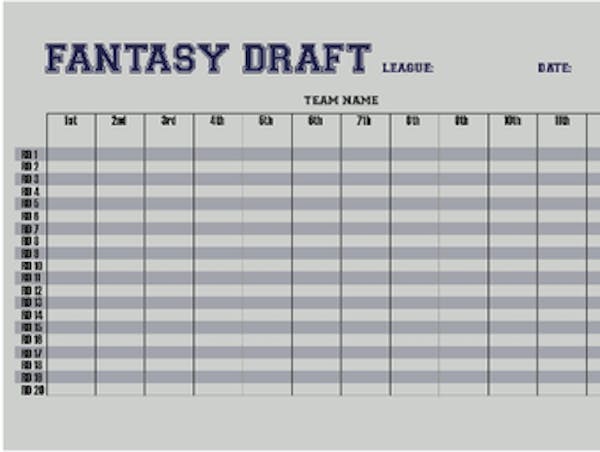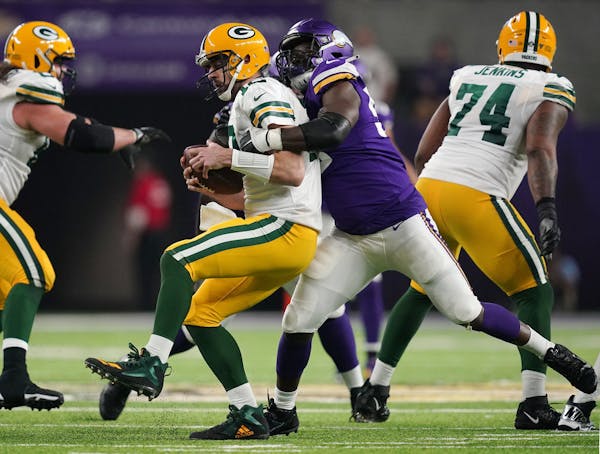Kirk Cousins' birthday falls on Aug. 19, arriving as a signpost each year in the middle of the NFL preseason to mark the continuation of a career that once seemed fated to end long before the quarterback reached his 30s.
He turned 32 this year, on the day the Vikings practiced in pads for only the third time since their NFC divisional playoff loss to San Francisco in January. Cousins spent the day throwing passes to rookie receiver Justin Jefferson, whose brother Jordan (older by eight years) worked out with Cousins at the 2012 NFL combine after playing quarterback at LSU.
"I said, 'Well, how old were you when Jordan was the quarterback at LSU?' " Cousins recalled. "[Justin] was like, 'Eight or nine years old.' That made me feel a little old. … But it's an honor. I've always said, if there's one place you feel good getting old, it'd be pro football, because the NFL does stand for Not For Long."
The coronavirus pandemic has scrambled the NFL schedule, jarring the routines of a sport steeped in mechanistic precision and leading stable organizations to be regarded as havens.
The Vikings doubled down this offseason on the structure they've built in recent years, with co-owner Mark Wilf citing a "body of work," as much as any postseason success, as the club's reason for extending the contracts of General Manager Rick Spielman and coach Mike Zimmer through 2023. The Vikings also wasted little time in offering Gary Kubiak the chance to return to play-calling duties, opting for continuity after offensive coordinator Kevin Stefanski became the Browns' head coach in January.
Cousins is, as much as any player in the Vikings organization, the on-field personification of their approach, heading into his ninth season as a quarterback who crowbarred his way into the NFL's loftiest tax bracket through preparedness, perseverance and an ability to keep things on track.
He is a former fourth-round pick, playing for a coach who has found a home after being turned down for multiple head coaching jobs and a GM who spent six years with the team before getting full control of the roster. The Vikings' men in power got there the same way Cousins did; no one will call his attributes flashy, but they've delivered him the stability he craves in an organization that values it just as much.
"Last season, I found myself saying, 'I don't want to move. I don't want to leave,' " Cousins said. "You find yourself saying, 'Hey, it's a lot easier to play if it's with the Minnesota Vikings. It's a lot easier to talk about playing into my late 30s if it's assumed I'm going to be here. Part of what makes that thought enjoyable is thinking that it would be in purple and gold."
After the most efficient statistical season of his career and leading the Vikings to an NFC wild-card playoff win, Cousins got what he'd hoped for on March 16: a three-year, $96 million contract. It came with a $30 million signing bonus, two more years of guaranteed salaries and a 2022 base salary of $35 million that becomes fully guaranteed on the third day of the 2021 league year.
The move caused wide receiver Stefon Diggs to go public with his long-simmering frustration, tweeting, "It's time for a new beginning" hours after Cousins finalized his deal. But it had long been clear the Vikings liked the structure they had built around their quarterback; the extension only made it official.
Perhaps at no point in his NFL career has Cousins been as solidified in his life as he is now, with a team that hasn't equivocated in its commitment to him, an offense built to his liking, a cul-de-sac house in Inver Grove Heights near friendly neighbors and a church with locations minutes from home.
He is as much the face of the Vikings offense now as he has ever been, after his overtime throws to Adam Thielen and Kyle Rudolph against the Saints diminished some of the national media chatter about his ability to win big games. He works with a group of pass-catchers reconfigured in Diggs' absence, with first-round pick Justin Jefferson and 2019 second-rounder Irv Smith Jr. expected to grow into larger roles. The Vikings' fortunes, to a great extent, are in his hands.
"Kirk is a critical part of our team and he's a leader in our locker room, and his play has really demonstrated warranting that kind of move," co-owner Mark Wilf said of Cousins' contract extension earlier this week. "On all fronts we were very supportive. As we saw last year, we saw him step up and take steps in an already successful career. Again, our coaches and personnel folks have that confidence in him, and we do as well."
A paradoxical year
At this time last year, when Cousins looked back on his 2018 season in an interview with the Star Tribune, he called it the best of his career, given what he was asked to do in an offense that threw 606 times while posting the third-worst run game in the league.
According to Football Outsiders, the Vikings' high-volume passing game was still only the 17th-most efficient in the league, in terms of the site's Defense-adjusted Value Over Average statistic. In 2019, as the Vikings' run game jumped from 24th to 10th in DVOA, the passing game improved to 11th.
Asked last week to assess his 2019 season in the same manner he'd looked back on his 2018 season a year ago, the quarterback called his year "sort of a paradoxical thing."
He threw only 444 passes in 15 games last year, but his adjusted yards per attempt — weighted positively for touchdowns and negatively for interceptions — were a career-high 8.7 last season, owing plenty to the friendly down-and-distance situations from which Cousins could fire downfield for Diggs.
The Vikings' theory of how to create offensive success puts them out of step with much of the analytics community, which says it's almost always preferable to throw more frequently, but it's endorsed by the man who's thrown all of their pivotal passes the past two years.
When the Vikings threw on second or third down last season, they needed an average of 7.9 yards for a first down — the third-shortest distance in the league, according to Pro Football Reference. They converted 42.1% of those second- and third-down attempts into first downs; only Baltimore (at 42.3%) did it more frequently.
"What was interesting about last season, as I took stock of it, was I found I was a very similar player myself to prior seasons," Cousins said. "A big difference was, we ran the ball so well that I actually did less, and to the observer, it was as if I did more."
He added: "I don't think we go down and beat the Saints unless we can run the ball effectively. That style of play was what enabled us to win games against good teams in tough environments."
Cousins will have a different play-caller for the fifth time in as many years, but the voice in his helmet will be that of Kubiak, who oversaw the scheme that helped the quarterback feel comfortable in 2019 and thrive particularly on bootlegs off play action.
In 2020, Cousins has talked about wanting to extend plays and improvise more often; he said it's actually the Vikings coaches who are nudging him to do more of it, especially when the offense might need a spark.
"It's a balance, right?" Cousins said. "If you're not running the offense, then you're not helping the team. You trust the plays, you run them. But when it's coming from the coaches, that they're encouraging me to try to make plays with my feet, make plays leaving the pocket with my arm, they're basically saying, 'Hey, this should be a part of our offense. It's just not being drawn up with Xs and Os.' So they're giving me latitude to do that."
Reasons to stay in Minnesota
Cousins' second contract in Minnesota, like his first, traded long-term certainty for short-term leverage. His initial deal made history as the first fully-guaranteed veteran contract in the NFL; the fact his $35 million base salary guarantee triggers in 2021, a year early, means the Vikings could be looking at another set of negotiations before next season.
In any case, Cousins' desire to play into his late 30s means he'd need at least one more contract to finish his career with the Vikings. He assesses the fit in Minnesota much like an in-demand job candidate, factoring in workplace culture, school systems and quality of life metrics; that is to say, he seems well aware he'd have options should he want to pursue them.
"It's a long list [of reasons to want to play here]," he said. "Not every team in the NFL has a fan base like this. I played for a good fan base in Washington, but you talk about a home gameday atmosphere, there are other good ones, certainly, but they're probably just a tie with U.S. Bank."
He mentioned the coaches, facilities, ownership group and personnel staff: "You're just saying, 'Man — just really, really good people and competent people in all those roles.' "
He moved on to his family. "You think about raising your kids, and know your boys are in a great place to grow up: tremendous neighbors, a great school system, a great church," Cousins said. "You start to realize there's a long list of boxes that are being checked when you're living in Minnesota and playing for the Vikings. It would certainly make it hard to go play elsewhere."
He also understands the fact he does not want to play anywhere else means he'll have to be effective enough for the Vikings to want to keep him.
The win over the Saints, Cousins said, was more important as a step toward the Super Bowl than it was as a means to answer his critics. The Vikings have talked obliquely all offseason about "taking the next step" or "getting over the hump" after January's 27-10 loss to the 49ers.
But everyone knows what that means: A franchise in Year 60 has everything it could possibly want, except a Lombardi Trophy.
How many more birthdays Cousins celebrates with a training camp practice in Eagan, ultimately, could depend on how many games he helps the Vikings win.
"I've got to go out and play at a high enough level where the Vikings are saying, 'Hey, we've looked around, and you're the guy we want,' " he said. "That's really something, even with a contract, you need to go out and earn every single day. I think that's something people maybe don't quite realize from the outside as much: Hey, signing a contract's great, but I need to go out and earn it every single day, or there's always more competition coming in to replace me, sooner than later."
![Minnesota Vikings quarterback Kirk Cousins (8) ran out for warmups at U.S. Bank Stadium.] Jerry Holt • Jerry.holt@startribune.com The Minnesota Viki](https://arc.stimg.co/startribunemedia/2FNMMF6S43WOOIO74JKDWWX7NM.jpg?fit=crop&crop=faces&w=550&&auto=format)



